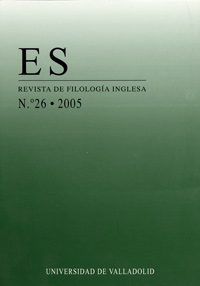|
Susana Álvarez Álvarez
Contrastive rhetoric and ESP: metatext in Spanish-English medical texts
|
7-22 |
|
María Teresa Calderón Quindós
The sensual human nature: a cognitive approach to religious poetry
|
23-42 |
|
Emilio Cañadas Rodríguez
Europe in the writings of Truman Capote or the steps to the creation of the non-fiction novel
|
43-70 |
|
María Aída Díaz Bild
A Star Called Henry and At Swim, Two Boys: the deconstruction of the tragic paradigm
|
71-90 |
|
Francisco Javier Díaz Pérez
The speech act of thanking in English: differences between native and non-native speakers-behaviour
|
91-102 |
|
Cayetano Estébanez
El significado del concepto de imaginación en Wallace Stevens y su origen en la obra de George Santayana
|
103-114 |
|
Marta Fernández Morales
Communicating the experience of war: the ‘us’ vs. ‘them’ dialectic in Eve Ensler’s Necessary Targets
|
115-30 |
|
José Ramón Fernández Suárez
A Connecticut Yankee: la afirmación de la cultura americana
|
131-146 |
|
Carlos Herrero Quirós
Traducción literaria y apropiación: apuntes para una tipología causal
|
147-156 |
|
Aitor Ibarrola Armendáriz
North of myself: a refashioning of masculinity in two best-selling novels on both sides of the Atlantic
|
157-170 |
|
Rosa María Jiménez Catalán & Soraya Moreno Espinosa
Promoting English vocabulary research in primary and secondary education: test review and test selection criteria
|
171-188 |
|
María Elena Rodríguez Martín
‘Unfaithfulness’ to Jane Austen?: communicating readings and interpretations of her novels through their films adaptations
|
189-200 |
|
Gerardo Rodríguez Salas
‘Germany is the home of the family’: a criticism of gender roles in Katherine Mansfield’s In a German Pension
|
201-212 |
|
Patrick H. Sheerin
Translating Patrick Kavanagh
|
213-222 |
|
María Teresa Vázquez de Prada Merino
La ironía en el Quijote y en Bleak House
|
223-240 |
|
Margarita Vinagre Laranjeira & María Lera
Long-distance tandem learning by e-mail: evaluation of a case study
|
241-263 |



